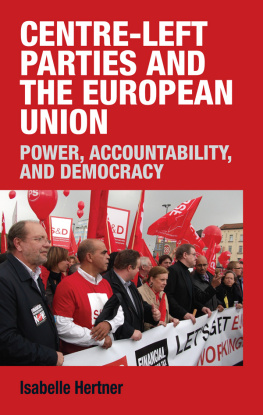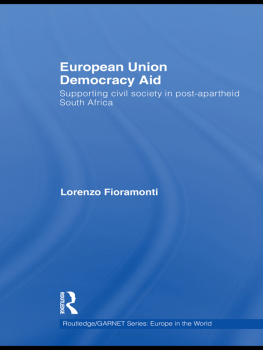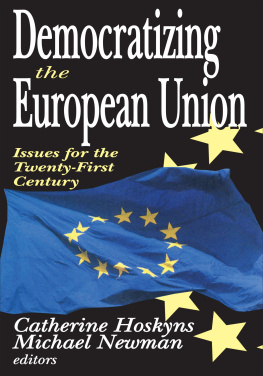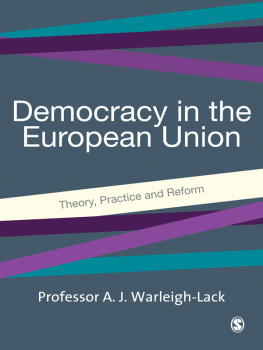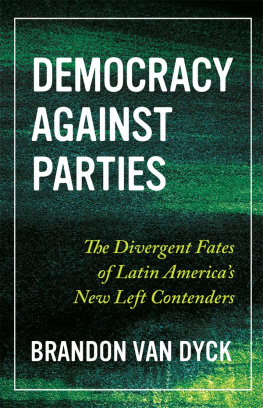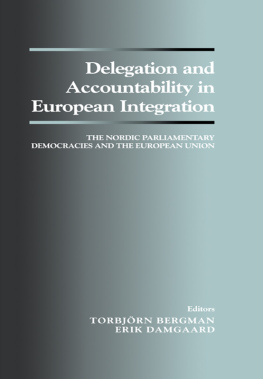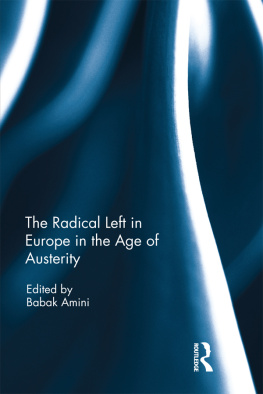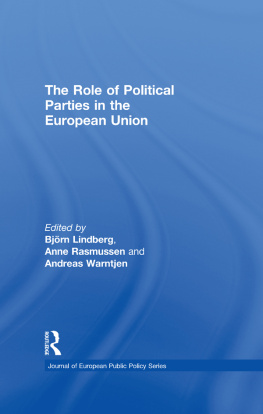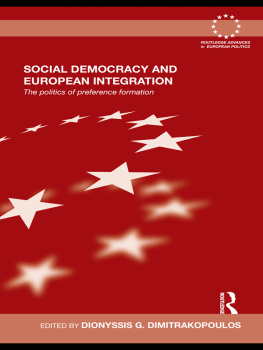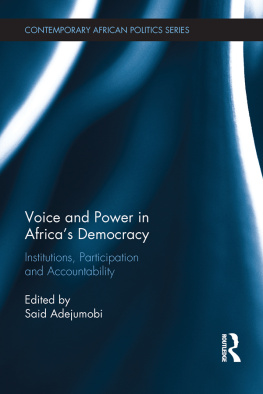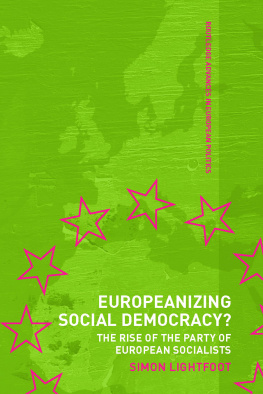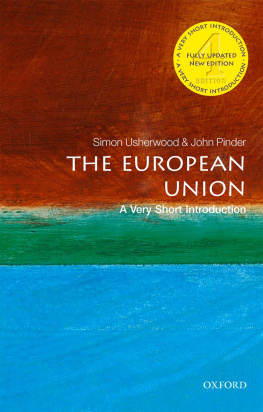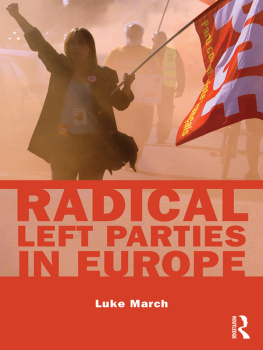Centre-left parties and the European Union
Centre-left parties and the European Union
Power, accountability, and democracy
Isabelle Hertner
Manchester University Press
Copyright Isabelle Hertner 2018
The right of Isabelle Hertner to be identified as the author of this work has been asserted by her in accordance with the Copyright, Designs and Patents Act 1988.
Published by Manchester University Press
Altrincham Street, Manchester M1 7JA
www.manchesteruniversitypress.co.uk
British Library Cataloguing-in-Publication Data
A catalogue record for this book is available from the British Library
ISBN978 1 5261 2033 5hardback
First published 2018
The publisher has no responsibility for the persistence or accuracy of URLs for any external or third-party internet websites referred to in this book, and does not guarantee that any content on such websites is, or will remain, accurate or appropriate.
Typeset by Out of House Publishing
To the memory of my mother, Sylvia Hertner, and my grandmother, Liselotte Schumpelt. And to my aunt, Kristin Schn.
Contents
Writing this book has been a long journey, one that wouldnt have been so happy and inspiring without the support of my family and friends.
I would first like to thank my father, Peter Hertner, and my brother, Christoph Hertner, for their encouragement and support.
Next, this book would not have been possible without my friends. Anna Bologna, ivind Bratberg, Sarah Emily Duff, Ricardo Grau Crespo, Gloria Iniesta Arias, Carlos Martinez Rico, Nina and Alex Mayrhofer, Katrin Metz-van Iem, Selma Nielsen, Joost Postma, Ana-Iuliana Postu, Kirsteen Shields, Luis Simn, and Katherine Twamley: you are wonderful.
I also take the opportunity to thank my many interviewees and survey respondents for taking so much time to share their expertise and experience with me. Without their input, I could not have written this book.
A number of colleagues have also helped me with this research. Dr Simon Lightfoot, Dr Michael Holmes, and Professor Robert Ladrech have been very supportive over the years, and their work has inspired me. I was also lucky to have been a member of a research and reading group on political parties at the University of Birmingham. I thank my former colleagues Dr Tim Haughton, Dr Karin Bottom, and Dr Daniele Albertazzi for the many insightful and enjoyable discussions we had.
The two anonymous reviewers helped me to clarify my ideas and focus on what is important. The team at Manchester University Press has also been extremely helpful and a pleasure to work with. Thank you!
Last but not least, I owe an enormous debt of love and gratitude to Nick, my husband, for always believing in me and supporting me in everything I do.
| AfD | Alternative fr Deutschland |
| BfB | Bund freier Brger Offensive fr Deutschland |
| CAE | Commission des Affaires Europennes |
| CDU | Christlich Demokratische Union Deutschlands |
| CLP | Constituency Labour Party |
| CLPD | Campaign for Labour Party Democracy |
| CLV | Campaign for Labour Victory |
| DUE | Dlgation pour lUnion Europenne |
| EMU | Economic and Monetary Union |
| EP | European Parliament |
| EPLP | European Parliamentary Labour Party |
| EPP | European Peoples Party |
| ESC | European Scrutiny Committee |
| EU | European Union |
| FB | Federal Bureau |
| FC | Federal Council |
| FN | Front National |
| LPC | Labour Presentation Committee |
| MARPOR | The Manifestos Project |
| NEC | National Executive Committee |
| NPF | National Policy Forum |
| OMOV | one-member-one-vote |
| PCF | Parti Communiste Franais |
| PES | Party of European Socialists |
| PiP | Partnership in Power initiative |
| PLP | Parliamentary Labour Party |
| Pro-DM | Initiative Pro D-Mark Neue Liberale Partei |
| PS | Parti Socialiste |
| SFIO | Section Franaise de lInternationale Ouvrire |
| SGCI | Secrtariat Gnral de Coopration Interministerielle |
| SI | Socialist International |
| SPD | Sozialdemokratische Partei Deutschlands |
| TTIP | Transatlantic Trade and Investment Partnership |
| UDF | Union pour la dmocratie franaise |
| UMP | Union pour un movement populaire |
Does European integration contribute to, or even accelerate, the erosion of intra-party democracy? This book is about improving our understanding of political parties as democratic organisations in the context of multi-level governance. More specifically, it analyses the impact of European Union (EU) membership on intra-party power dynamics. The book takes as its focus the British Labour Party, the French Socialist Party (Parti Socialiste, PS), and the German Social Democratic Party (Sozialdemokratische Partei Deutschlands, SPD). These are three major centre-left parties of government, operating in the three biggest member states of the EU.
Studying centre-left, or social democratic, parties is particularly interesting because the process of European integration places particular policy constraints on them. As part of the social democratic/socialist/labourite party family, they seek to reconcile market capitalism with social responsibility. In its different forms, social democracy is a set of intuitive ideas about fairness and equality and a moral economy that refuses to accept the automatic primacy of markets or the need for inequality (Keating and McCrone, : 73) has been particularly challenging for centre-left parties in government. The SPD and PS, both of which were in office during the peak of the Greek debt crisis, struggled to formulate and implement a social democratic strategy at the European level. Yet, a European crisis can only be solved by a European response.
, 3 September). Again, there were significant differences between policy areas, as 23 per cent of laws in the area of justice and home affairs emanated from the EU, whilst in agriculture, 52 per cent were of EU origin.
The focus of this study is contemporary and embraces the period since the early 2000s when all three parties have been both in government and in opposition. This allows us to investigate power dynamics inside parties that were at times constrained by being in government, and at other times were in opposition and could take time to develop new policies and strategies. Through the use of a principalagent framework, this book studies the delegation of the power to formulate European policy and select candidates for the European parliamentary elections and other EU specialists within the Labour Party, the PS, and SPD. In short, this book connects to the broader debate in political science of how membership of the EU affects domestic political institutions.
The rise of anti-political sentiment across Europe over the past decades has focused the attention of journalists and scholars on voters mistrust of politicians and political institutions such as long-established parties. Indeed, electoral support for mainstream parties on the centre-left and centre-right of the political spectrum keeps shrinking, whilst anti-establishment parties such as the UK Independence Party, the

